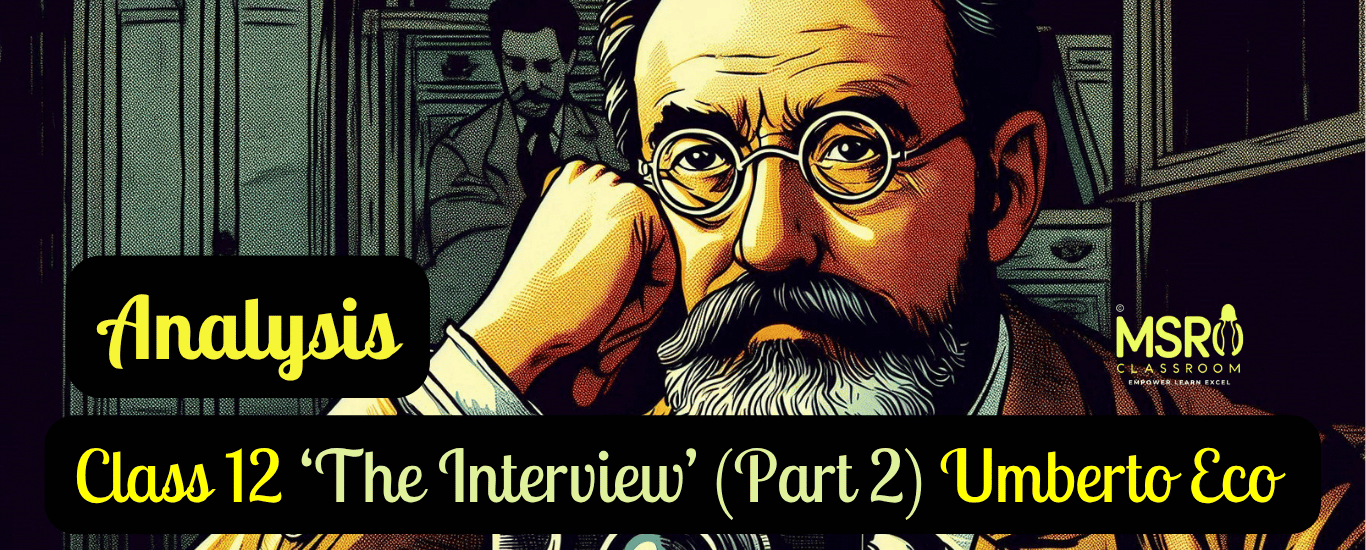“The Interview-Part II” Summary, Explanation, Theme, Question Answers,
‘An Interview with Umberto Eco’ by Mukund Padmanabhan
Table of Contents:
Also Read: Class 12– Interview (Part 1)
Summary ‘An Interview with Umberto Eco’:

In the excerpt from an interview conducted by Mukund Padmanabhan from The Hindu with Umberto Eco, he talks about his career as a scholar and novelist. Eco reflects on his philosophy and approach to writing, emphasising the narrative aspect he incorporates into his scholarly essays.
He also shares insights into his transition from academia to fiction writing, noting that he began writing novels later. Despite his extensive scholarly output, Eco acknowledges that he is often primarily recognised as a novelist.
The conversation also touches upon the unexpected success of his novel “The Name of the Rose” and the reasons behind its popularity, attributing it partly to its exploration of medieval history and mystery.
Theme ‘Interview-Part II‘:
The excerpt from the interview with Umberto Eco revolves around the multifaceted nature of his identity and work, juxtaposed with the perceptions and expectations of the audience and the industry. As an interview, it is a communication genre that delves into the author’s thoughts, experiences, and reflections.
Key themes explored in the excerpt include:
- Identity and Versatility: Eco ponders his identity as a renowned university professor and novelist. Though he has made significant contributions to academia, people recognise him mainly as a novelist, which intrigues and bothers him to some extent.
- The Creative Process: Eco’s writing approach emphasises narrative style, which stems from his early experiences presenting his doctoral dissertation. His belief in storytelling as a powerful tool for communication and expression led him to write scholarly works with a narrative aspect and later venture into novel writing.
- Audience and Perception: The interview discusses the popularity of Eco’s works, including “The Name of the Rose.” Eco challenges the idea that readers only want accessible experiences and shows that depth can captivate audiences. Despite tackling complex subjects, Eco’s success highlights the diversity of readers’ interests and the unpredictability of literary success.
- Mystery and Chance: Eco ponders the unexpected success of “The Name of the Rose”, attributing it to its exploration of medieval history and enigmatic narrative appeal. He emphasises the mystery surrounding the book’s popularity, suggesting that timing and circumstance played significant roles in its reception.
(More about the Theme in the video below)
The interview excerpt provides insights into Eco’s intellectual journey, his views on writing and storytelling, and the complexities of engaging with diverse audiences within literature and academia. As a communication genre, the interview is a platform for Eco to share his perspectives and experiences, offering readers a deeper understanding of his multifaceted identity as a scholar and novelist.
Explanation of ‘An Interview with Umberto Eco’ for Auditory Learners:
Duration: 10 minutes
Subtitles and Time stamps are available.
Textbook Question/Answers- “Interview- Part II”:
Understanding The Text:
Q1: Do you think Umberto Eco likes being interviewed? Give reasons for your opinion.
A1: Umberto Eco likely enjoys being interviewed to some extent, evident from his engagement with philosophical ideas, use of storytelling, humour, and willingness to share personal anecdotes. However, he may also find interviews challenging due to balancing personal and intellectual aspects, managing public perception, and navigating personal boundaries, especially given his preference for academic circles over public appearances.
While Eco appreciates the dialogue, complexities in his feelings about being interviewed arise from his personality, professional background, and the nature of the conversation.
Q2: How does Eco find the time to write so much?
A2: Umberto Eco finds time to write extensively by utilising what he terms “interstices” or empty spaces in life. He mentions waiting for an elevator and engaging in writing activities. Eco’s ability to seize upon these moments allows him to make productive use of what might otherwise be considered downtime.
His dedication to writing, particularly on Sundays, demonstrates his commitment to his craft despite his busy schedule as a professor and scholar.
Q3: What was distinctive about Eco’s academic writing style?
A3: Umberto Eco’s academic writing style was distinctive in its narrative approach and personal engagement. Unlike conventional scholarly works that often maintain a depersonalised and dry tone, Eco incorporated storytelling elements and shared his research journey, including trials and errors.
The narrative aspect made his academic writings more accessible and engaging to readers. Eco’s approach challenged traditional academic norms by infusing his scholarly works with personal reflection and storytelling, fostering a deeper connection with his audience.
Q4: Did Umberto Eco consider himself a novelist first or an academic scholar?
A4: Umberto Eco considered himself an academic scholar first and foremost, identifying primarily with the academic community. He referred to himself as a university professor who writes novels on Sundays, indicating that his primary professional identity lies within academia.
Although Eco achieved significant fame and success as a novelist, he continued to maintain his affiliation with academic circles. He participated in academic conferences rather than prioritising events related to literature or creative writing.
While he acknowledged his role as a novelist, Eco’s self-perception as an academic scholar remained central to his identity.
Q5: What is the reason for the huge success of the novel, The Name of the Rose?
A5: The huge success of Umberto Eco’s novel, “The Name of the Rose,” stems from its multifaceted themes, intellectual depth, unique setting in a medieval monastery, cultural relevance, positive reception, and the author’s established reputation as a scholar and intellectual figure. The intricate plot, rich characters, and blend of mystery and suspense also contributed to its widespread popularity and enduring legacy.






